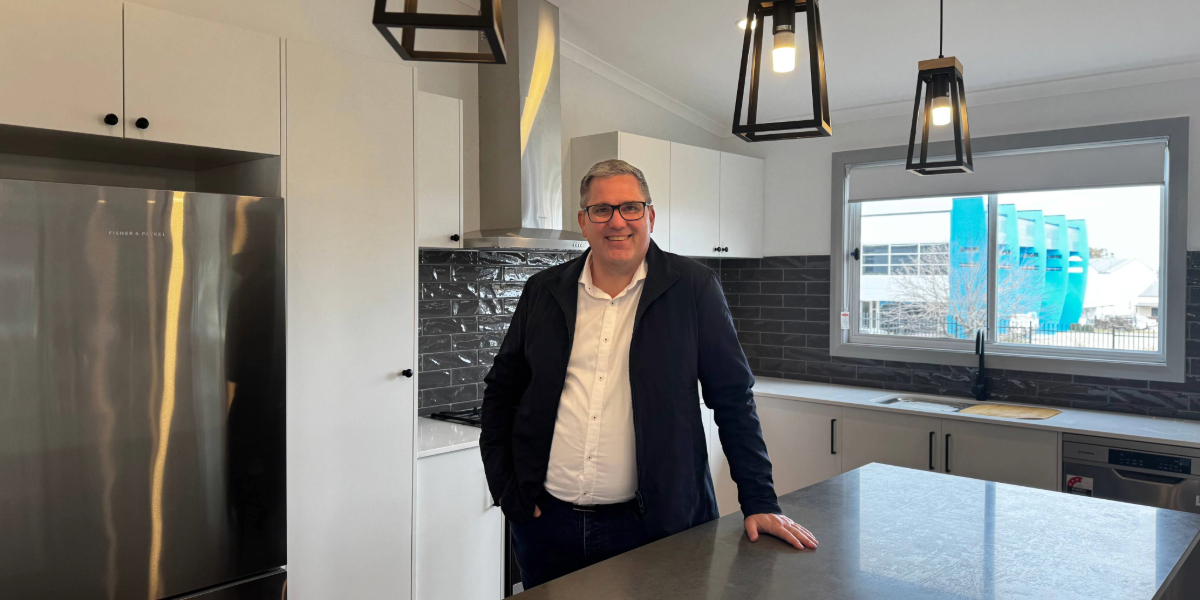“Funnily enough, this thing, which I’m standing in, which looks like a building and feels like a building, according to planning regulation, is not a building,” said Uniplan CEO Ben Scott.
And the leader of one of Armidale’s most successful businesses is right – according to current NSW law, a modular home is not considered a building, but is regulated in the same set of rules as caravans.
Scott has been one of the strongest voices arguing for legislative reform to better enable modern forms of construction to play their part in addressing the housing crisis. The call has been heeded to some extent, with the NSW Government investing over $10m on modular housing developments in growth corridors around Sydney.
But as Business NSW calls for urgent action to deal with housing shortages, and the Minns Government trumpets that they are pulling “every lever” to build more homes in NSW, bigger reforms proposed by the Building Commission NSW appear to have stalled.
Urgent housing reforms needed to unlock New England North West growth, says new report
A new report released on Tuesday by Business NSW has sounded the alarm on the housing crisis in the New England North West (NENW), warning that regional business growth, workforce attraction, and liveability are at risk unless urgent reforms are enacted.
The Housing in NENW Report outlines a series of immediate, short-term and long-term actions to tackle housing shortages, ease planning delays and make affordable, diverse housing a reality for communities across the region.
“This campaign is a call to action,” said Diane Gray, Regional Director of Business NSW – NENW.
“In every town and across every sector, the housing shortage is holding back our potential. This is not just a social issue, it’s a workforce and economic development crisis. If we cannot house our people, we cannot grow our businesses.”
The report identifies seven core areas for reform: planning system efficiency, infrastructure funding, housing diversity, financial incentives, affordable housing, workforce accommodation, and innovation in construction.
The report claims planning approvals in the region are taking years rather than months, and infrastructure costs are deterring new developments. Essential workers—such as teachers, healthcare professionals and tradies—are struggling to find affordable homes close to their workplaces, threatening service delivery and economic stability.
The report was informed by roundtable consultations with local councils, business leaders, planners, and housing experts, and builds on insights from previous advocacy campaigns in Western Sydney.
“Housing Now! is about practical, short-term steps, asking what we can do now, next and later. It’s a roadmap to have homes built faster and smarter,” Ms Gray said.
Among the recommendations are reforms to fast-track development approvals, the use of artificial intelligence to streamline assessment processes, and the rollout of prefabricated and modular housing in regional centres.
Modular housing is seen as critical to addressing the shortage of supply, because it currently takes 240 days – or a full working year – to build a traditionally constructed home, and a modular home built in a factory like Uniplan’s Seaton Street facility takes just 21 days. It is also seen as a particularly important solution in regional areas where the shortage of builders is more acute, and larger developments are not as viable.
Minns Government trumpets action while shelving real reform
The list of legislation and regulations that need reform to improve and speed up home construction is lengthy and involves all three levels of government.
Most legislative reform is necessarily complex and slow, and when it comes to making sure people’s homes are safe to live in and people do not find themselves in unmanageable debt, caution is always the order of the day. However, as it currently stands under NSW law a modular home is not a building, which has significant consequences for both planning approvals, regulations, and also makes it difficult for banks to money for factory built homes, like the ones that Uniplan makes, as part of a traditional home loan.
Scott says he has been engaging with the Planning Department on these issues since 2015.
“Over the last decade, there’s been discussions from the Planning Department about rehashing and revamping the Environmental Planning Act, the building act, and everything that goes with it to bring modular building and modern methods of construction into mainstream building,” he said.
“It’s not only affecting us as modular builders, but also affecting any modern methods of manufacturing.”
Those discussions have resulted in the Building Bills – a complex and massive piece of legislative form that abolishes nine pieces of legislation and replaces it with one unified set of three bills with common definitions and embraces advances in the industry. In a webinar posted online as part of the consultations last year, changing the definitions was highlighted as a major objective of the reform.
“I would highly recommend to New South Wales Planning Department, let’s get that done,” he said.
“Because what that [legislative reform] does, is this thing that looks like a duck and quacks like a duck, we can actually call it a duck – or a building in this case,” Ben Scott said.
“And likewise, when we’re going to a bank and asking for a loan, we can say we’d like you to loan us some money for a building.”
“It’s on the table and has wide support, so let’s get that done.”
Formal consultations on the reforms were held in 2022, and a draft Building Reform Bill was circulated in October last year. However, something has gone awry, with the reforms now buried in process, and bureaucratic doublespeak the only answer to questions about where things are up to.
“The bills are with cabinet; policy priorities and timelines are still to be determined,” said the media team that looks after the Building Commission NSW.
“The Bills are currently being updated in light of extensive consultation with stakeholders from over 100 industry firms, Government and NSW community groups,” said a spokesperson for the Minister for Building, Anoulack Chanthivong.
When asked what the hold up was – given the consultation formally ended eight months ago – the ministerial aide said the consultation was ongoing.
When asked to clarify if the bills were being updated or the consultation was ongoing, the aide reverted to the first line about the bills being updated.
These reforms were being driven by the Building Commission NSW. Any mention of the reforms could not be found on their website, including a position paper circulated in August 2024 which details changes made to the bills on the basis of feedback from stakeholders, and which is usually the last step before bills are presented to parliament.
Instead of the Building Bill, the Minns Government has this week announced budget measures to extend tax concessions for build-to-rent (BTR) housing developments; and said they will release draft guidelines to speed up the delivery of homes and infrastructure through works-in-kind agreements with developers. These two small – and city-developer-friendly – measures are, according to the announcement this week, the Minns Labor Government “pulling every lever available to address the housing crisis”.
“Whether it’s new tax incentives, planning reforms or fast-tracking infrastructure, we’re focused on making it faster and easier to build the homes and communities NSW needs,” the Premier Chris Minns said.
Regional leaders work together to get it done
Regional Australia Bank and Uniplan are working together to forge a path forward despite the apparent political reluctance, with a pilot program to be launched soon that will enable people to get a single loan to buy a block of land and construct a modular home.

“We believe that the best people to solve regional Australian challenges are regional Australians,” said Regional Australia Bank CEO David Heine.
Heine explained that the availability and cost of capital is a function of risk, which in turn, is a function of the ability for the borrower to service that debt. He said that this is all a very heavily regulated area with an assumption that the building is on the same piece of land as the land itself.
“The issue with modular housing is, of course, unlike typical housing where the house is being built in situ on the block of land, we’ve got this division where bits of the security are held in different hands at different places.”
Heine says that usually what happens is that those intending to build modular homes need to get two different loans – one for the land, and one for the home. Because the home under construction is physically not in the possession of the eventual home owner, it makes it difficult for a bank, should something go wrong, to recover their money – which makes the risk greater.
“For most banks, the effort required to overcome these challenges just isn’t worth it,” he said, “but as a Mutual Bank – and I proudly stand here as the CEO of a regional, Australian owned Mutual Bank – we aren’t held back by the same constraints.”
Regional Australia Bank and Uniplan have been developing a new product which the two organisations feels will make a meaningful impact in their combined abilities to present this type of modular housing solution to ordinary regional Australians on a far more common basis.
“So this pilot program that we’ve commissioned, which I hope will start in the month of July, will allow us to bring those two parts together just one loan, and to ultimately allow greater funding levels to both individuals and families as they use providers like Uniplan to use modular housing as a great solution.”
Heine cautions there is still more work to be done to make it work.
“There’ll be different contracts that we require to be built, possibly even changes to legislation to accommodate this type of activity.”
“Once we’ve solved these security issues, we need to educate investors and create standardised wholesale funding solutions.”
He says the problems sound really technical, but describes himself as “bullish”, saying none of the issues are insurmountable.
“There are so many public, private, wholesale and retail investors that would welcome this combination of social and economic issues.”
“Rather than sit around and wait for someone else to find the solution, your bank, regional Australia, bank will play its role in conjunction with partners like Uniplan to find more solutions.”
Read all the way through to the end of the story? So did lots of other people. Advertise with New England Times to reach New England locals who are interested and engaged. Find out more here.

